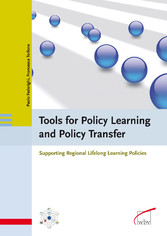Suchen und Finden
Mehr zum Inhalt

Tools for Policy Learning and Policy Transfer - Supporting Regional Lifelong Learning Policies
3. Virtual support service for mutual learning Francesca Torlone (p. 51-52)
3.1 Virtual service supporting the Soft Open Method of Coordination
The website www.mutual-learning.eu is an example of an instrument for promoting cooperation between regional governments for the purpose of policy learning in the field of lifelong learning policy. The web-based devices, created in support of the Open Method of Coordination between Regions, relate to the field of lifelong learning policy and are intended to improve the quality and underpin the transfer of innovation between the regional systems in the various countries of the European Union. These devices cover, for example, the policies directed at young school dropouts and the increase in the participation of adults in non-formal educational activities.
3.2 Contents of the virtual support service
The instruments underpinning mutual learning between regional governments available on the internet are: Networking support etworking for expressing common interests in benchmarking as regards lifelong learning and identifying institutional partners who are interested and available. In this way it is possible to measure progress, identify strengths and weaknesses, assess the effect of a policy and/or a measure in the regional contexts in which they are applied for the purpose of monitoring and possibly re-addressing the policies. The database containing detailed information on the various policy measures adopted by the various regional governments.
Information is collected by means of the use of common indicators, according to shared methods of identification, with the interpretation of the sources being passed to the reference institutions and research centres involved at the stage of the collection, analysis and description of the data relating to the measures. The database can be freely consulted from the home page of the service, but data may only be added by the research centres which screen the quality of the information prior to publication. This instrument, which is used for consultation and as a source by various research centres involved in other comparative surveys of policy measures, also contains background documentation which describes the policies in question.
The database fully satisfies the need for the immediate exchange of information between individuals and institutions that are geographically separated and from different backgrounds. However, for the purposes of ensuring that the service instrument is as functional as possible as regards exchange and trans-regional cooperation activities, data update actions must be planned. But since reports, information, publications and material dealing with the effect of a measure within a territory are shared, the online database can in the final analysis be regarded as one of the most valid and effective tools in the field of mutual learning between regional governments.
The dedicated research engine, supporting searches of the websites and web pages of the Regions themselves. The operating modalities and identifiability of online sources means that the research tool is more functional and focused on the planning and decision-making activities of the regional policy makers. In this case, too, there are inevitable restrictions of a technical nature, associated on the one hand with the need for a common glossary to screen the terminology used by the different countries in the area of lifelong learning, and the concern, on the other hand, once again, about the risk of the perishing and ageing of the sources available on the internet.
The service supporting contact building with the political and institutional authorities concerned with the lifelong learning policies of other Regions for the purpose of setting up study visits which contribute to the undertaking of joint actions likely to produce innovation.
Alle Preise verstehen sich inklusive der gesetzlichen MwSt.







